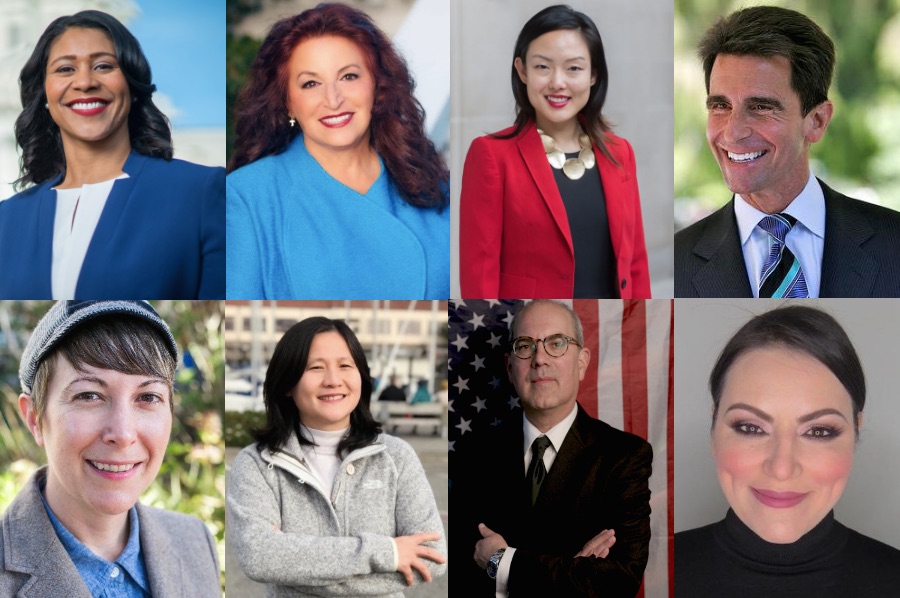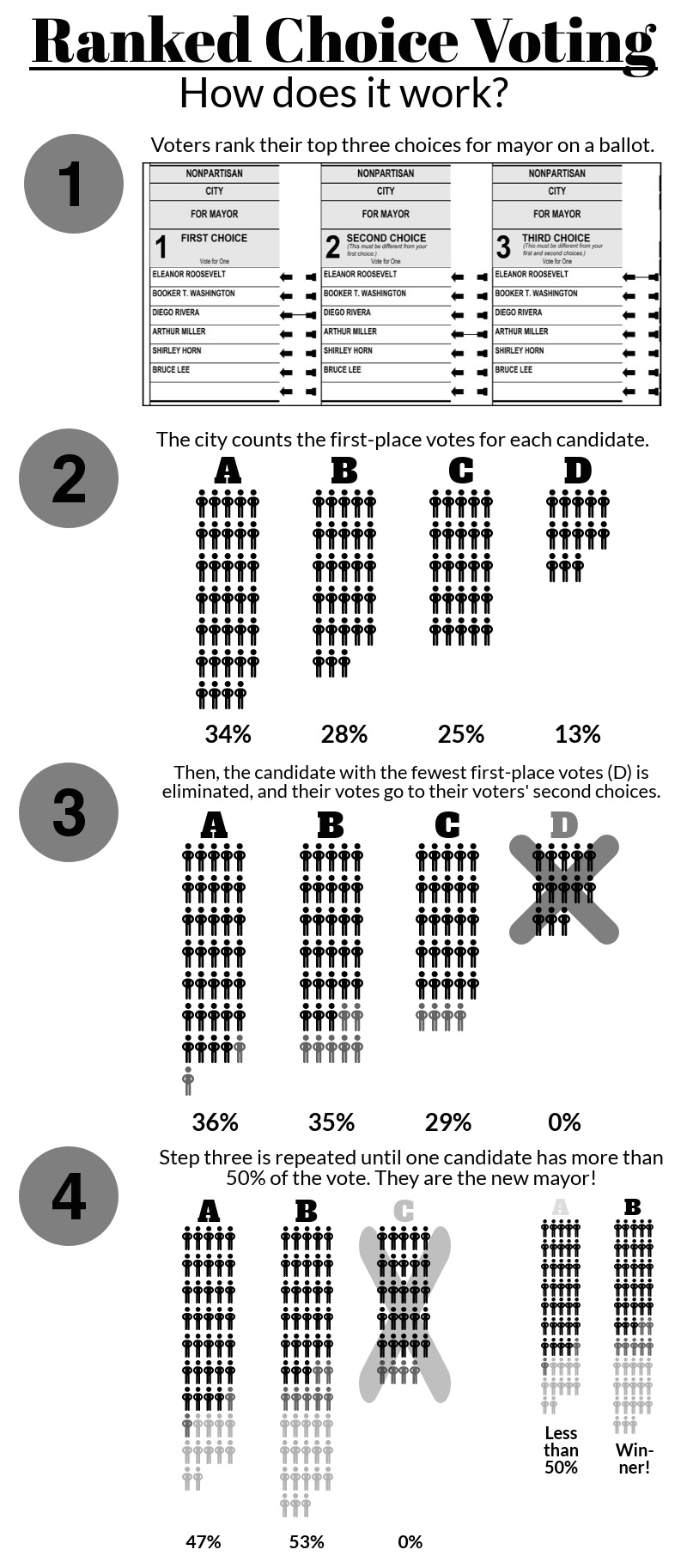
Following Mayor Edwin Lee’s tragic passing on December 12, a special mayoral election was scheduled to determine an interim mayor. According the San Francisco Department of Elections’ Candidates webpage, the final deadline to file for candidacy for the June 5th election was January 9.
In total, eight mayoral candidates have confirmed their candidacy: London Breed, Angela Alioto, Jane Kim, Mark Leno, Amy Farah Weiss, Ellen Lee Zhou, Richie Greenberg, and Michelle Bravo.
Originally, 26 people declared their intention to run for mayor. However, most failed either to collect the necessary 13,000 signatures or pay the $6,531 filing fee. Though such restrictions may have cut the field down to a more manageable size, they also restrict access to the political arena. As Republican candidate Richie Greenberg believes, running for mayor has “become a privilege, not a right.”
Amid concerns about the influence of venture capitalist and political donor Ron Conway, worries persist about the fairness of campaign finances, focused particularly on a London Breed-aligned Super PAC titled “In Our Time.” Its organizers say the PAC has no connection to Conway, who supports Breed. Still, “we don’t need all those millions of extra dollars” in city elections, says rival candidate Mark Leno. “Voters should be able to choose their next mayor without the corrupting influence of all of this big money.” Super PACs allow donors to fund political campaigns without disclosing their contributions. By contrast, donations directly to a candidate’s campaign — of which Leno has collected over $400,000, more than any other candidate — are openly posted on the San Francisco Ethics Commission website.
One of the most contentious issues in the upcoming election is San Francisco’s escalating lack of cheap housing. Tiffany Ng from the Chinese Progressive Association warns, “San Francisco is in the midst of a housing crisis that is reaching to all corners including long standing working class neighborhoods like Excelsior, Bayview, and Visitacion Valley. I think first and foremost, many candidates will have to address displacement/gentrification/homelessness and their stance on affordable housing.” Similarly, Richie Greenberg worries that the city’s housing policies are pushing families out of San Francisco. “They can’t live in a studio apartment. They need a one-bedroom or two-bedroom.” He thinks that the mayor needs to encourage developers to build “across the housing spectrum.”
Another critical issue will be San Francisco’s status as a “sanctuary city.” Ng explains, “I think it’s important that all elected officials take a stance on immigration and commit to upholding the protections that come with the sanctuary city ordinance. With the threat of impending ICE immigration raids in Northern CA, many community members are fully vigilant and living in fear of separation from their families and children.”
Among the election’s frontrunners is Board of Supervisors president London Breed. First elected to represent District 5 (the Western Addition, Haight-Ashbury, and the Inner Sunset) in 2012, she was named acting mayor after Lee’s death, becoming the first female mayor of color in San Francisco history, as well as the second African-American to hold the position. In a post on Medium on the hot-button issue of affordable housing, she writes that “we need a creative, multi-faceted solution and a mayor who’s committed to making it happen.” She has positioned herself not only as that type of dedicated policy wonk, one who has helped people access affordable housing in their own neighborhoods and modernized MUNI’s buses and trains, but as a successor to Mayor Lee’s relatively moderate politics. Breed has been endorsed by the San Francisco Firefighters’ Union.
Angela Alioto, another candidate with an extensive background in politics, is a former Board of Supervisors president and the daughter of former San Francisco Mayor Joseph L. Alioto. Alioto promotes herself as a native San Franciscan with deep roots in public service. She declares that “[her] experience is unmatched in this race” and that she has a “strong record” of creating compromise. Alioto also warns that “[San Francisco] residents are struggling,” and, like many other candidates, promises to work on housing issues to improve the quality of life “for all San Franciscans.” If elected mayor, Alioto’s priorities would include homelessness, housing, transit, neighborhood safety, education, and healthcare.
In contrast, far-left voters can choose between a former state senator and a close local ally of Bernie Sanders.
Supervisor and organizer Jane Kim, who represents District 6 (SoMa, Mission Bay, the Tenderloin, Civic Center, and Treasure Island), boasts what she calls a “track record of being bold [and] fighting for ideas” such as a $15 minimum wage, the Free City campaign to make community college education tuition-free for all San Francisco residents, and an increase in affordable housing the Mission Bay development. In particular, she’s made her name fighting for more, and cheaper, housing — she claims to have negotiated for the authorization of the most affordable housing than any other supervisor over the last seven years — which endears her to the left. In fact, in a closely contested State Senate election in 2016, Kim won the endorsement of Bernie Sanders. “It’s time for fundamental change,” she says. If elected, she wants to make San Francisco a progressive “example to the rest of the nation.”
Mark Leno offers policy experience in both city and state government. He touts his track record of “fighting for those without a voice” — his legislative achievements range from protections for transgender foster youth, to raising the statewide minimum wage, to limiting solitary confinement in the juvenile justice system. Leno has identified regional teamwork as the key to alleviating problems such as a lack of affordable housing, high rates of homelessness, and traffic congestion. “We can’t solve [these issues] alone,” he says. “We’ve done it before. When we built the Golden Gate Bridge, that was a regional effort. The same with our BART system. We did it because it had to get done.”
The four non-Board of Supervisor candidates consist of Amy Farah Weiss, Ellen Lee Zhou, Richie Greenberg, and Michelle Bravo.
Mayoral contender Amy Farah Weiss is not new to the campaign scene, having run in the 2015 mayoral election and securing over 12% of the vote. Her slogan “VOTE 1-2-3 FOR EQUITY” urges voters to put Weiss as their 1st, 2nd, or 3rd choices for Mayor. Weiss has a background in community organizing and is the founder of public-benefit organization Neighbors Developing Divisadero, an advocate for “inclusive, culturally-enriching, and sustainable housing policy and economic development. She is running as a “pro-worker” candidate and promises a “fair share” economy. Some of Weiss’ major policy proposals include establishing a public bank, transitional housing for the homeless, fiscal efficiency and tax reform, financial reparations for the African American community, the reintroduction of Vote16, and a public wifi network.
Candidate Ellen Lee Zhou, whose background lies in social work and public service, offers a very different platform. According to her campaign website, she seeks to “re-build a better San Francisco” and return “law and order” to the city. Lee Zhou believes that San Francisco “has been going in the wrong direction,” and that “right now, we are too liberal, too self-seeking, too progressive and too ridiculous.” Major platform items include criminalizing recreational marijuana, building affordable housing (particularly for teachers), enforcing government accountability, and protecting residents from criminal activities. Despite being an immigrant herself, Lee Zhou opposes San Francisco’s sanctuary city status. She plans to “improve public health and safety” by solving “existing problems” such as drug abuse, homelessness, and the widening income gap between the city’s working class and upper-income residents. In addition, Lee Zhou has been a Sunday School teacher for 23 years and says, “the David and Goliath story inspired me to run for this Mayor 2018 race [sic]. I will do my best and God will do the rest.”
Business consultant Richie Greenberg is running to prevent San Francisco’s “capitalist democracy” from becoming a “communist, socialist state.” Though, as the only Republican in the election he might seem to have an uphill battle to win a San Francisco election, he believes that since the seven Democrats “dilute their portion of the voting block,” conservative and centrist solidarity gives him “a definite possibility to win.” Prioritizing reforms he claims will protect the quality of life, Greenberg wants to create more family housing, beef up the police department, and defund programs that help homeless populations.
Michelle Bravo, a self-described “holistic health practitioner,” is running under the slogan “Transparency of Better Community.” Bravo’s top priorities include hiring a “competent vice-mayor,” improving infrastructure and housing, addressing homelessness, and prohibiting the use of tasers by police. Bravo also seeks to expand the use of de-escalation tactics in police procedure.

In this election, a voting mechanism known as “ranked choice voting” will be used to determine the winning candidate. Adopted by San Francisco in 2002, ranked choice voting allows voters to choose their first, second, and third choices on the ballot (see infographic for details of the process). The system favors candidates with broad popularity over those with a larger base but less widespread appeal. It also changes campaign strategy. Candidates with little chance to win might nevertheless receive more first-place votes on ballots, since voters can always place more prominent candidates as their second or third choices.
Recently, the replacement of London Breed with Mark Farrell as acting mayor has raised questions about San Francisco political allegiances. According to the San Francisco Chronicle, the 6-3 vote was led by Supervisors Aaron Peskin and Norman Yee, both of whom have endorsed Mark Leno in the upcoming election. Farrell supporters claimed that Breed would wield too much administrative authority by holding both the office of mayor and position as president of the board of supervisors simultaneously, and worried about her ties to Ron Conway. However, according to KTVU, many community members vocally objected to the vote, outraged at the racial implications of replacing Breed with Farrell, a white male venture capitalist.
In addition, the lack of a candidate with the full support of the Chinese community contributes to the uncertainty in this upcoming election. According to the San Francisco Chronicle, Chinese Americans will make up as much as 20 percent of the June electorate. Ng suggests that “each candidate will try to maximize their votes by appealing to a diverse community of people. In recent years, political candidates have increasingly needed to develop a communications and outreach strategy to appeal to Chinese voters.”
To some, the absence of an overwhelmingly favored candidate signals the potential for change and renewed engagement from voters. Sandra Fewer states, “San Francisco has not had an open mayoral election in 15 years and I think it is time that voters get to voice their opinion on whether or not they agree with the direction San Francisco is going. We are voting on the future of San Francisco and the importance of this election requires every San Franciscan to be an informed voter.”
Furthermore, this upcoming election has considerable implications on the next San Francisco mayoral election, scheduled for November 5th, 2019. While the winner of the current election will only be an interim mayor for about one year, whoever wins the 2019 election will serve a full four-year term. The winner of the June 5th election could potentially gain name recognition and establish a strong track record while in office, advantages if they seek re-election in 2019.






